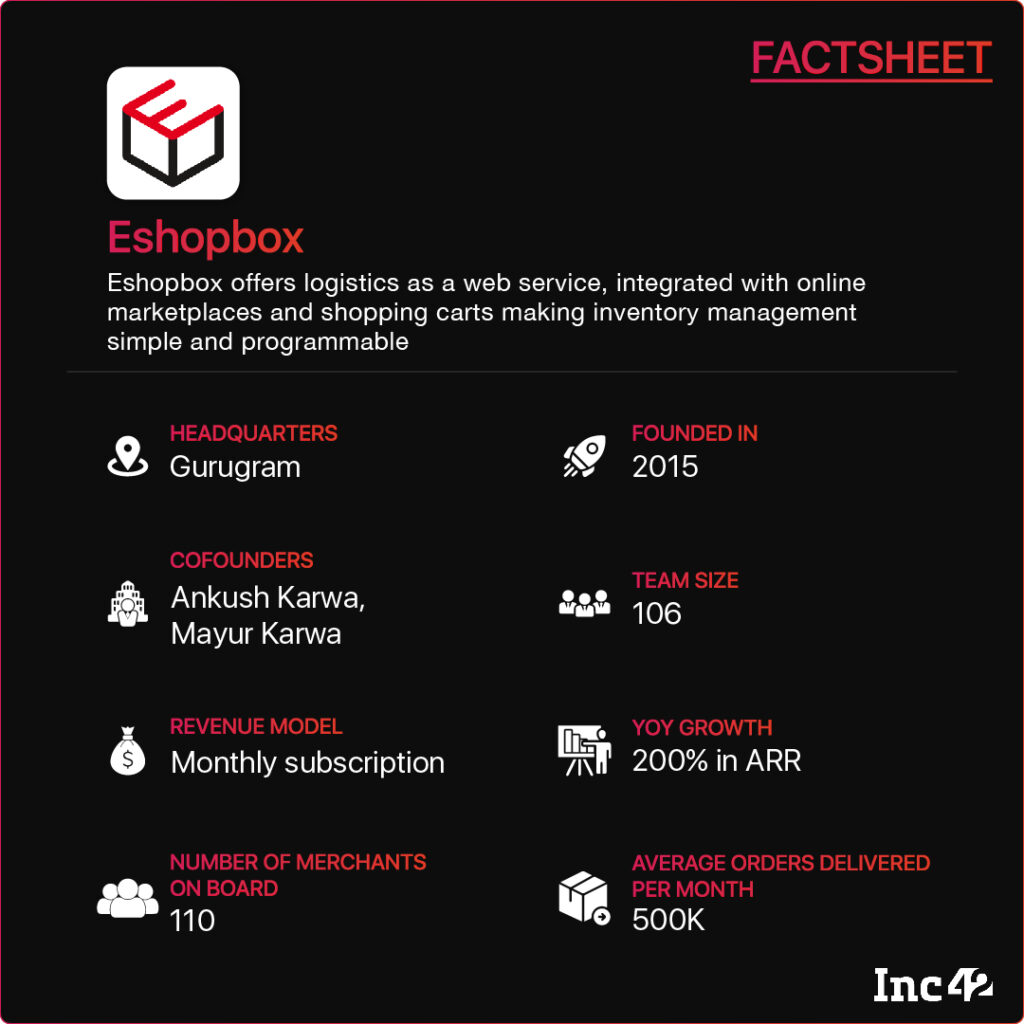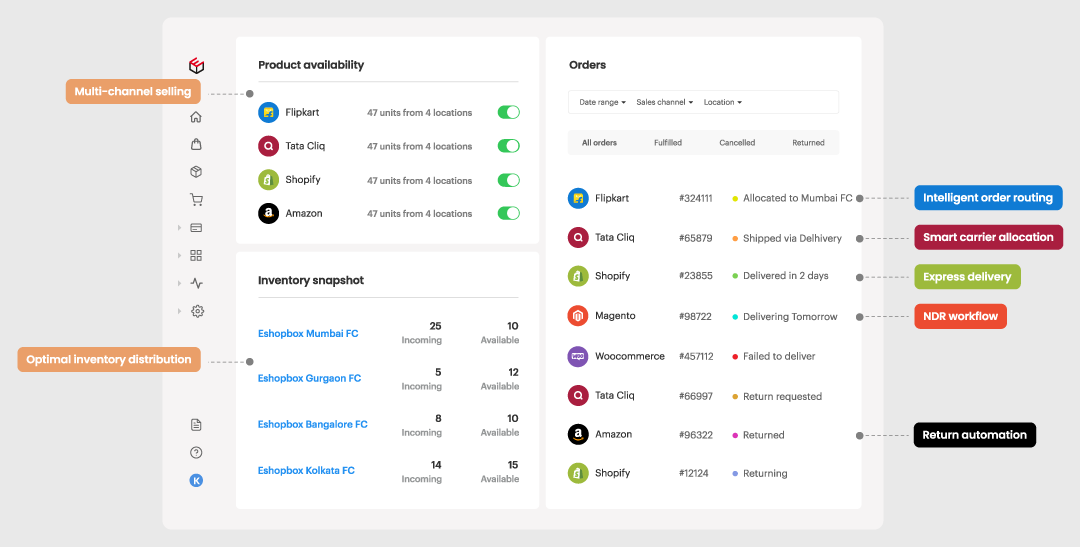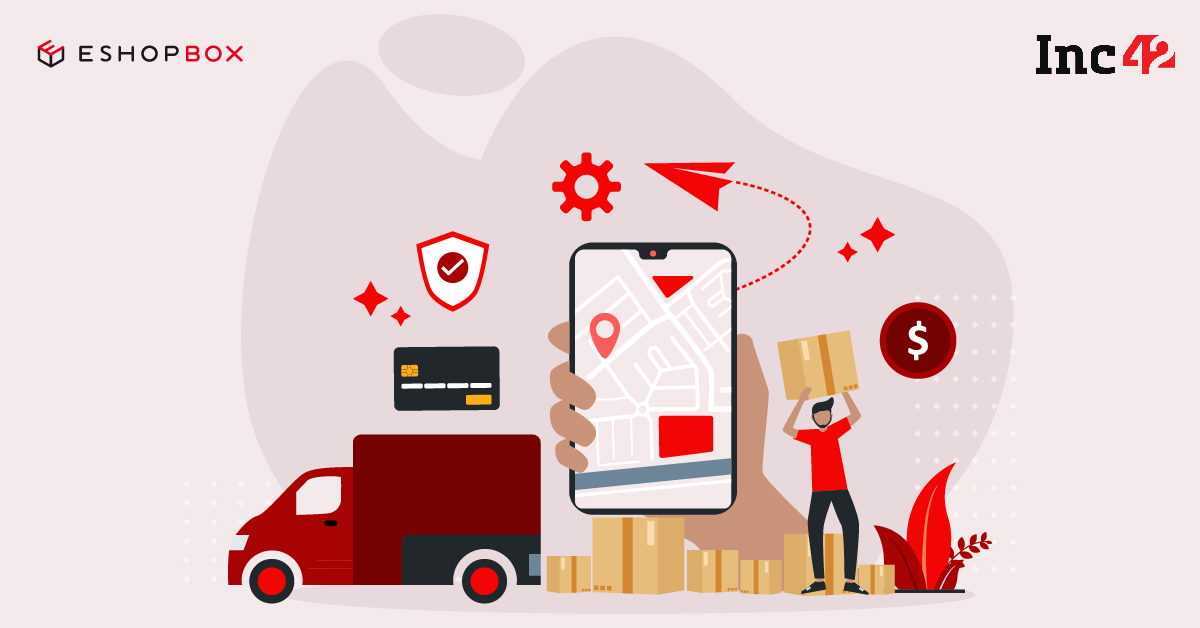Online shopping has changed dramatically since the pandemic hit the world. Offline shoppers have entered the realm of the internet to enjoy its convenience, and veteran e-shoppers have gone beyond marketplaces to discover the value addition brought forth by direct-to-consumer (D2C) brands on their dedicated websites. Additionally, digital consumers have high expectations while ordering products online. Consumers today want more transparency in delivery dates, faster turnaround time, instant refunds and a hassle-free return policy.
In essence, even as platforming solutions make setting up a digital store easy and social media platforms help in effective marketing, there is still a logistics puzzle to solve in order to build a fast-growing business.
As customers prefer to buy on platforms of their choosing, most digital-first businesses are now adopting a multichannel strategy for greater reach, increase in sales and better customer retention.
Although a lot of payment and logistics functions are managed while selling on marketplaces, it is easier said than done. Selling on multiple online marketplaces can pose many challenges. Selling on any marketplace requires more working capital to manufacture the stock and keep it at these platform’s warehouses for early delivery. Additionally, each platform’s business has its own system and guidelines for listing the products, managing the inventory, processing the order, and multiple variable fees and varied payment mechanisms. In the midst of juggling between numerous processes, it is easy to lose track of important strategic matters such as unit economics, identifying profitable demography for the brand and more.
Ankush Karwa, a lawyer from the ILS Law College in Pune, and his cousin Mayur Karwa, an IIT-Bombay alumnus, experienced it first-hand. The duo set up Factory Rush in 2014, an online retail platform that brought products directly from leading factories worldwide.
But the first-time entrepreneurs ended up spending more time and effort on inventory and logistics instead of product sourcing and customer engagement. Even after outsourcing the warehouse operations to 3PL companies, they had to find multiple courier partners for delivery. Additionally, multiple stakeholders were handling their operations and there was no one to build an end-to-end post-purchase experience.
“There were so many touchpoints that our team struggled to track the order status in real-time. Moreover, customers were frustrated due to slow deliveries as we were operating from one location. Those 3PL companies asked for a minimum volume commitment and long-term contracts for each location. Also, logistics companies were not using technology at the time to manage warehousing. So, their workflow lacked the desired speed and accuracy,” Ankush recalled.
The roadblocks spurred the duo to reimagine how goods should be moved from merchants to buyers seamlessly, and Eshopbox was set up in 2015. The Gurugram-based company specialises in end-to-end logistics management and offers integrated solutions to help pure-play digital sellers (merchants only selling on third-party marketplaces) and D2C companies (multichannel sellers) deal with warehousing, inventory and shipping challenges.

The company has set up a network of warehouses across India and tied up with multiple national as well as regional carriers. It offers its logistics services to sellers and brands on demand through a simple to use web-based fulfilment software called Eshopbox Workspace.
The ecommerce tech and logistics company has pre-integrated the software with multiple platforms such as Shopify as well as major marketplaces including Amazon, Flipkart (along with Myntra), Reliance-owned AJIO and Tata CLiQ to offer a unified inventory view and seamless purchase and post-purchase experience to customers across multiple channels. Here is a quick look at the company’s bouquet of services before we explore each offering.

Growth Enablement Through Optimised Inventory Management
Using sales and traffic data, Eshopbox helps merchants optimally distribute inventory according to the order volume in different regions. This enables the merchants to offer faster deliveries. The logistics startup claims that this will enable businesses in boosting their conversion and repeat purchase rates.
Further, the company makes the merchant’s inventory available for sales from not only its website but all major marketplaces. This helps the merchants in selling through multiple channels and drive higher sales without investing more working capital in stocks.
Additionally, Eshopbox helps merchants earn the coveted Amazon prime and Flipkart assured badges on their listing which increases visibility on the platform. To enable this feature, the startup participated in invite-only warehouse integration programmes run by major marketplaces. For instance, Amazon has a ‘smart connect warehouse integration’ programme in place, while Flipkart runs a ‘smart fulfilment’ programme for this purpose.
Under this programme, Eshopbox’s warehouse management technology and processes at every location undergo regular audits and checks by marketplaces. This is done to ensure the delivery speed and accuracy are on par to meet their customer experience standards. As a benefit of this collaboration, merchants can optimise their logistics costs by just sending the inventory to Eshopbox warehouses instead of marketplaces as well as refilling the inventory faster. It improves the regional in stock percentage which is an important metric to maintain a high rank on the marketplace’s search page. Eshopbox also offers drop-shipping solutions for brands that supply inventory to key sellers appointed by Amazon and Flipkart.
“Traditionally logistics is looked upon as a cost centre, but Asian paints built a remarkable distribution network using years of proprietary data on paint demand for each neighbourhood in India and grew its revenue at 20% per annum for 60 years. Eshopbox is a similarly intelligent and data-driven distribution network that drives revenue for the new age D2C brands” says Mayur.
According to the company, businesses can raise their sales up to 4x through its marketplace tie-ups for inventory optimisation and logistics operations.
“Working with Eshopbox allowed us to get the Amazon Prime badge on all the product listings, this helped us boost product visibility and sales on Amazon. We also have the flexibility to sell on other marketplaces without exclusively committing inventory to Amazon warehouses,” says Rishubh Satiya, Cofounder, Plixlife.
Businesses of all sizes work with Eshopbox including emerging digital brands like Oziva, The Souled Store, startup unicorns like Glance, MPL and established brands like Being Human, Pidilite industries, Raymond Apparel and others.
Logistics Stack, No-Code Engagement Tools For D2C Players
A seamless logistics module: Eshopbox has additional offerings for D2C brands selling products on their dedicated websites. Using AI-based recommendations and an intuitive system, the company has rolled out a platform to build, configure and automate the logistics workflow for managing inventories, shipping merchandise and handling returns in minimum time without putting pressure on existing resources. Better still, there is a plug-and-play API that can be easily integrated with the backend to launch the logistics module on D2C websites.
Tech-Driven Materials Handling Eshopbox uses an AI-powered picking/stocking system instead of a putaway based on product types or manual navigation at the time of picking and packing. Besides, every product arriving at the company’s fulfilment centres is measured for weight, dimension and fragility to pre-determine suitable packaging and avoid weight discrepancy with shipping partners. Overall, the system ensures a speedy and efficient workflow that minimises manual delays.
At present, Eshopbox has six warehouses in India, three in Mumbai and one each in Gurugram, Kolkata and Bengaluru. The company claims that each facility has an inventory processing speed of 100K units a day.
AI for delivery optimisation: Eshopbox collects data of its courier partners in real-time to analyse their performances at different touchpoints (pick-up to transit, transit to last mile and last-mile to delivery). Using this data, it recommends the best performing delivery partners for each region. Also, based on the time of the order placed and the next available pick-up slots, it can recommend courier partners that can reach the end customer sooner than scheduled. It also reduces RTO instances by verifying the customer’s phone number on its own and checking against fraudulent activities.
No-code customer engagement tools: A new integration with the startup’s interface offers customisable, no-code tools across post-purchase touchpoints to help buyers stay in control of their orders and thus improve the overall customer experience. For instance, a D2C website can enable its customers to track their orders on the site itself by entering order numbers. Eshopbox also gathers real-time updates from its courier partners for accurate package tracking and quick resolution of any unexpected delivery issues. It has also automated non-delivery instances by interacting with the customer and last-mile delivery operators.
Another feature facilitates customised return modules for specific products by adding time limits so that buyers will feel comfortable about placing orders online. A brand can also add exchange options instead of returning products. Other features include changing delivery location post-purchase and cancelling an order after purchase.
Real-Time Insights To Make Data-Driven Decisions
While managing the logistics is just half the picture, Eshopbox also unifies & organizes data from various sources for brands to make smart decisions in real-time. As an end-to-end fulfilment provider, Eshopbox is in a unique position to know how many orders are processed on each sales channel, which location was it fulfilled from, which shipping carrier was used, what payment amount is expected from each order, who will make this payment, and when the payment is expected. Clients can use our reconciliation workflow to track payments easily. With this payment data collected in one place, our clients can go a step further to understand their gross earnings for each order, profitability for each SKU, to make intelligent pricing and merchandising decisions in real-time
The company charges a monthly subscription fee starting at INR 15K and fulfilment fees on a per order basis and remains confident to reach an annualised recurring revenue of $5 Mn by March FY22.
The Journey Ahead
India’s 3PL landscape has become highly competitive, with a plethora of players like Delhi-based Shiprocket, Gurugram-based Eshopbox and Pickrr, and Pune-based Xpressbees ruling the roost. As a result, 3PL players are focussing on more comprehensive and customisable solutions to help businesses stay ahead of the curve.
“We will continue to expand our network to offer same-day delivery in 80 more cities. Just like AWS eliminated the need of maintaining physical data centres for internet business, Eshopbox will be a unified platform of commerce and fulfilment products to build digital brands without owning logistics infrastructure,” says Mayur.
Interestingly, logistics operators like Eshopbox have gone beyond classical shipping and started operating as a tech enabler and a strategic partner, provisioning digital-age add-ons, optimising shipping costs and maximising good post-purchase experience. Together, these initiatives lead to improved conversion and long-term customer retention, as 3PL players continue to arm D2C brands and other ecommerce sellers with tools and facilities to ship worldwide, fast.
Today, propelled by the pandemic and consumer’s growing internet adoption, the ecommerce market size has reached $84 Bn in 2021, growing 3.5X from 2017 when it was valued at $24 Bn. Keeping up with the trends, it is expected to reach up to $200 Bn by 2026.
Given this scenario, players in the 3PL space are likely to witness a continued boom. However, the market leaders in this segment will be those who can merge essential and futuristic components in a seamless product offering to meet the requirements of new-age customer-facing businesses.










